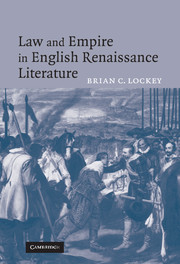Book contents
- Frontmatter
- Contents
- Acknowledgments
- Introduction: Romance and the ethics of expansion
- PART I ROMANCE AND LAW
- 1 Transnational justice and the genre of romance
- 2 Natural law and charitable intervention in Sir Philip Sidney's Old Arcadia
- 3 Natural law and corrupt lawyers: Riche, Roberts, Johnson, and Warner
- 4 Spenser's legalization of the Irish Conquest
- PART II THE PREROGATIVE COURTS AND THE CONQUEST WITHIN
- Conclusion: English law and the early modern romance
- Index
3 - Natural law and corrupt lawyers: Riche, Roberts, Johnson, and Warner
Published online by Cambridge University Press: 22 September 2009
- Frontmatter
- Contents
- Acknowledgments
- Introduction: Romance and the ethics of expansion
- PART I ROMANCE AND LAW
- 1 Transnational justice and the genre of romance
- 2 Natural law and charitable intervention in Sir Philip Sidney's Old Arcadia
- 3 Natural law and corrupt lawyers: Riche, Roberts, Johnson, and Warner
- 4 Spenser's legalization of the Irish Conquest
- PART II THE PREROGATIVE COURTS AND THE CONQUEST WITHIN
- Conclusion: English law and the early modern romance
- Index
Summary
Like Sidney, writers such as Barnabe Riche, Henry Roberts, Richard Johnson, and William Warner used the genre of romance in order to explore issues of transnational justice. However, in contrast to Sidney who seems thoroughly unconcerned with native English legal traditions, these writers are alternately drawn to and repulsed by such traditions. Their ambivalence reflected an ongoing contemporary controversy concerning the nature of the common law tradition. J. G. A. Pocock has contributed a great deal to our understanding of this controversy by identifying a pervasive sixteenth and early seventeenth-century legal ideology which he has termed the “common-law mind.” Pocock uses this term to describe the belief, beginning in the second half of the sixteenth century among English lawyers, that the English common law was uniquely compatible with the character of the English people. Coke's thirteen Reports (1600–15), a voluminous recording of trials during the Elizabethan and Jacobean periods, collectively represent the most significant contribution to this Renaissance legal ideology. But while Coke was certainly the common law's most ardent champion, he was also simply one among a number of prominent adherents to some form of the common-law ideology, including Sir John Fortescue (whose fifteenth-century classic, De Laudibus Legum Angliae, was not published until the mid-sixteenth century), Sir John Davies, Thomas Hedley, Sir Henry Finch, John Doddridge, Edward Hake, and at least in selected parts of their respective corpi, William Lambarde and John Selden.
- Type
- Chapter
- Information
- Law and Empire in English Renaissance Literature , pp. 80 - 112Publisher: Cambridge University PressPrint publication year: 2006



